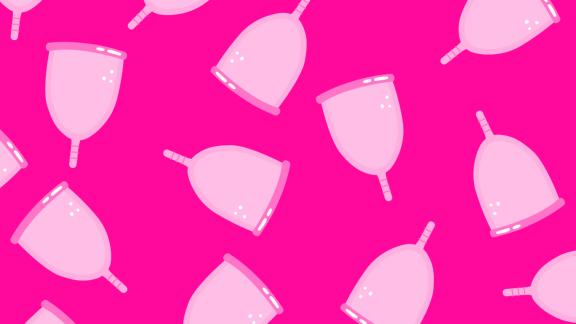In many cultures and societies, individuals with vaginas are accustomed to thinking that touching and peeking at their genitals is inappropriate or that taking ownership and autonomy of our own body and pleasure seems a whimsical story. The way we are constantly lectured about our bodies has informed our ideas and attitudes around sexual and reproductive health, particularly menstrual health.
I live in Nepal, where menstruation has been, and still is, a taboo. A few years ago, I signed up for the social networking platform Clubhouse, where I joined virtual ‘rooms’ where people talked openly about menstruation and menstrual cups. Being a newbie to menstrual cups while at the same time advocating their use, I felt proud and excited every time I shared or heard people talking about it.
when
country
Nepal
region
South Asia

There were a lot of people wanting to use the menstrual cup, but the only hindrance between them and the menstrual cup was fear— fear of the unknown.

The vagina is a mystery for many of us. And something like a menstrual cup that goes inside the vagina can surely create anxiety and confusion among menstruating individuals.
Many might not know, but a menstrual cup is a small funnel or bell-shaped menstrual product which is foldable, reusable, eco-friendly and cost-effective. It is made from silicone, rubber or latex that collects menstrual blood when inserted into the vagina. It is also available in different sizes and colours, which can be worn for up to 12 hours and stay with you for at least five to 10 years.
In Nepal, the constant phenomenon of humiliation, guilt, and the need to keep one’s natural bleeding as obscured as possible has seized our freedom to scrutinize ourselves as well. It has also prevented our ability to explore menstrual products like tampons and menstrual cups over conventionally used menstrual pads or cloth pads.
So, where does this fear of using cups come from? And how do we win over our fear and find acceptance? I think there are various reasons for fear to exist among us. For instance, lack of information and education on reproductive health, being unable to break the cultural oppression of using pads because of uncertainty, inaccessibility, expenses, proper toilet facilities/services, and other resources.
The idea of inserting foreign objects inside the vagina during the period can feel scary and uncomfortable. Many participants in the Clubhouse group asked common questions like: What if the cup gets lost inside? What if it travels beyond the uterus? Undoubtedly, the fear of uncertainty comes from within, but it is also because of the traditional knowledge in Nepal that is passed from generation to generation. If questioned, especially by young girls or women, they are shut down for being disobedient or lacking respect for elders.

We are brought up in a patriarchal society, and the schooling system of knowing reproductive organs or menstruation is limited to our health books only.

Considering the fact that these queries were raised in Clubhouse: a privileged social platform — I assumed they were more aware of the answers. But after reflecting on my assumptions for several days, I found a common thread: in it, i.e. we are brought up in a patriarchal society, and the schooling system of knowing reproductive organs or menstruation is limited to our health books only.
Thus, deeply rooted misconceptions, misunderstandings, or no understanding at all regarding women’s health and menstruation has fueled the fear of using a menstrual cup.
I remember it was back in 2017 when I first saw an advertisement for the menstrual cup on Facebook. I browsed the products’ website time and again as it grabbed my attention for being a vegan product. I got my cup in 2018 as a motivation but little did I know it would be in my cupboard as a precious yet hidden gift for more than three years. I read the instructions given on that box hundreds of times in between, watched countless Youtube videos and explored endless articles and conversations among cup users. There were many days when I would just sigh, drained, and say “screw it.”
Eventually, with courage and wit, I tried to insert the menstrual cup during the COVID lockdown. I failed the first time, and several times after that. . Finally, the day came in April 2020 when my vagina welcomed the cup.
I couldn’t agree more with the fact that choosing menstrual products is a personal choice and a privilege. But if you hold the privilege, then let these pervasive cultural messages be shattered.
In recent months, I have been closer to my period health than before. Struggling with loving my body for several years and later using a menstrual cup has deepened my friendship with my body. For a long time, the internet has played a significant role for me in understanding the need for self-love, body image and feeling that I am not the only one feeling certain emotions.
With the mindful approach of verifying ideas and information from different sources, I have experienced the positive side of the internet.

I am gradually becoming comfortable and closer with my reproductive organs, which have welcomed the whole new alternative universe inside me.

Putting my fingers inside and outside to insert, fix, and remove my cup has liberated my relationship with the so-called taboo part of a woman’s body. Every time when I dispose of my period blood, I see its colour and volume, which has now become a communication tool between my internal system and the whole of me. I would say, it’s not easy to be who you are with your body and it takes hell lots of effort and courage to get there.
There have definitely been ups and downs ever since I started writing and publishing about menstruation in newspapers and on my own blogs as part of my advocacy. There are days when I am encouraged and appreciated for sharing collective feelings. But there are other days where my advocacy on the topic is discouraged. One of my articles on menstruation got reported and blocked on Facebook for my use of an artistic image of the vulva that supposedly incited ‘violence of community guidelines’.
Still, I love talking about this issue and I will continue to talk about menstruation and the stigma attached to it in a heteronormative-patriarchal society that considers something as natural as period as “impure”.
Untold Period Stories is a digital movement that focuses on shifting the narratives surrounding menstruation through storytelling, education, art, and advocacy into a non-judgmental space. Our aim is to shift people’s perspectives on menstruation: from impure to pure, from taboo to normality focusing on visuals, videos, and audio while making informed choices on their bodies and menstrual products.
Time and again, I stand by this quote of Rabbi Hillel who famously said, “If I am not for myself, who will be for me? If I am only for myself, what am I? If not now, when?”
This piece was republished with permission from the author and Body & Data, where it was originally published.










